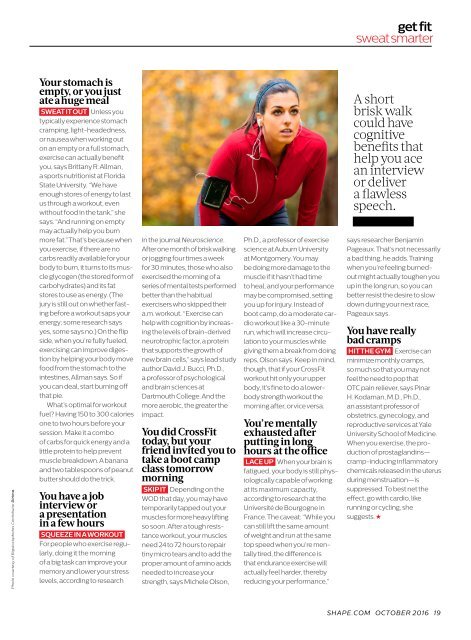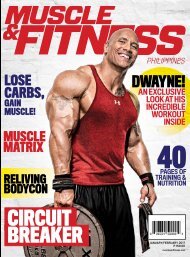SHAPE_OCTOBER_2016
You also want an ePaper? Increase the reach of your titles
YUMPU automatically turns print PDFs into web optimized ePapers that Google loves.
sweat smarter<br />
Photo courtesy of Bigstockphotos Contributor Dirima.<br />
Your stomach is<br />
empty, or you just<br />
ate a huge meal<br />
SWEAT IT OUT Unless you<br />
typically experience stomach<br />
cramping, light-headedness,<br />
or nausea when working out<br />
on an empty or a full stomach,<br />
exercise can actually benefit<br />
you, says Brittany R. Allman,<br />
a sports nutritionist at Florida<br />
State University. “We have<br />
enough stores of energy to last<br />
us through a workout, even<br />
without food in the tank,” she<br />
says. “And running on empty<br />
may actually help you burn<br />
more fat.” That’s because when<br />
you exercise, if there are no<br />
carbs readily available for your<br />
body to burn, it turns to its muscle<br />
glycogen (the stored form of<br />
carbohydrates) and its fat<br />
stores to use as energy. (The<br />
jury is still out on whether fasting<br />
before a workout saps your<br />
energy; some research says<br />
yes, some says no.) On the flip<br />
side, when you’re fully fueled,<br />
exercising can improve digestion<br />
by helping your body move<br />
food from the stomach to the<br />
intestines, Allman says. So if<br />
you can deal, start burning off<br />
that pie.<br />
What’s optimal for workout<br />
fuel? Having 150 to 300 calories<br />
one to two hours before your<br />
session. Make it a combo<br />
of carbs for quick energy and a<br />
little protein to help prevent<br />
muscle breakdown. A banana<br />
and two tablespoons of peanut<br />
butter should do the trick.<br />
You have a job<br />
interview or<br />
a presentation<br />
in a few hours<br />
SQUEEZE IN A WORKOUT<br />
For people who exercise regularly,<br />
doing it the morning<br />
of a big task can improve your<br />
memory and lower your stress<br />
levels, according to research<br />
in the journal Neuroscience.<br />
After one month of brisk walking<br />
or jogging four times a week<br />
for 30 minutes, those who also<br />
exercised the morning of a<br />
series of mental tests performed<br />
better than the habitual<br />
exercisers who skipped their<br />
a.m. workout. “Exercise can<br />
help with cognition by increasing<br />
the levels of brain-derived<br />
neurotrophic factor, a protein<br />
that supports the growth of<br />
new brain cells,” says lead study<br />
author David J. Bucci, Ph.D.,<br />
a professor of psychological<br />
and brain sciences at<br />
Dartmouth College. And the<br />
more aerobic, the greater the<br />
impact.<br />
You did CrossFit<br />
today, but your<br />
friend invited you to<br />
take a boot camp<br />
class tomorrow<br />
morning<br />
SKIP IT Depending on the<br />
WOD that day, you may have<br />
temporarily tapped out your<br />
muscles for more heavy lifting<br />
so soon. After a tough resistance<br />
workout, your muscles<br />
need 24 to 72 hours to repair<br />
tiny micro tears and to add the<br />
proper amount of amino acids<br />
needed to increase your<br />
strength, says Michele Olson,<br />
Ph.D., a professor of exercise<br />
science at Auburn University<br />
at Montgomery. You may<br />
be doing more damage to the<br />
muscle if it hasn’t had time<br />
to heal, and your performance<br />
may be compromised, setting<br />
you up for injury. Instead of<br />
boot camp, do a moderate cardio<br />
workout like a 30-minute<br />
run, which will increase circulation<br />
to your muscles while<br />
giving them a break from doing<br />
reps, Olson says. Keep in mind,<br />
though, that if your CrossFit<br />
workout hit only your upper<br />
body, it’s fine to do a lowerbody<br />
strength workout the<br />
morning after, or vice versa.<br />
You’re mentally<br />
exhausted after<br />
putting in long<br />
hours at the office<br />
LACE UP When your brain is<br />
fatigued, your body is still physiologically<br />
capable of working<br />
at its maximum capacity,<br />
according to research at the<br />
Université de Bourgogne in<br />
France. The caveat: “While you<br />
can still lift the same amount<br />
of weight and run at the same<br />
top speed when you’re mentally<br />
tired, the difference is<br />
that endurance exercise will<br />
actually feel harder, thereby<br />
reducing your performance,”<br />
A short<br />
brisk walk<br />
could have<br />
cognitive<br />
benefits that<br />
help you ace<br />
an interview<br />
or deliver<br />
a flawless<br />
speech.<br />
says researcher Benjamin<br />
Pageaux. That’s not necessarily<br />
a bad thing, he adds. Training<br />
when you’re feeling burnedout<br />
might actually toughen you<br />
up in the long run, so you can<br />
better resist the desire to slow<br />
down during your next race,<br />
Pageaux says.<br />
You have really<br />
bad cramps<br />
HIT THE GYM Exercise can<br />
minimize monthly cramps,<br />
so much so that you may not<br />
feel the need to pop that<br />
OTC pain reliever, says Pinar<br />
H. Kodaman, M.D., Ph.D.,<br />
an assistant professor of<br />
obstetrics, gynecology, and<br />
reproductive services at Yale<br />
University School of Medicine.<br />
When you exercise, the production<br />
of prostaglandins—<br />
cramp-inducing inflammatory<br />
chemicals released in the uterus<br />
during menstruation—is<br />
suppressed. To best net the<br />
effect, go with cardio, like<br />
running or cycling, she<br />
suggests.<br />
<strong>SHAPE</strong>.COM <strong>OCTOBER</strong> <strong>2016</strong> 19















